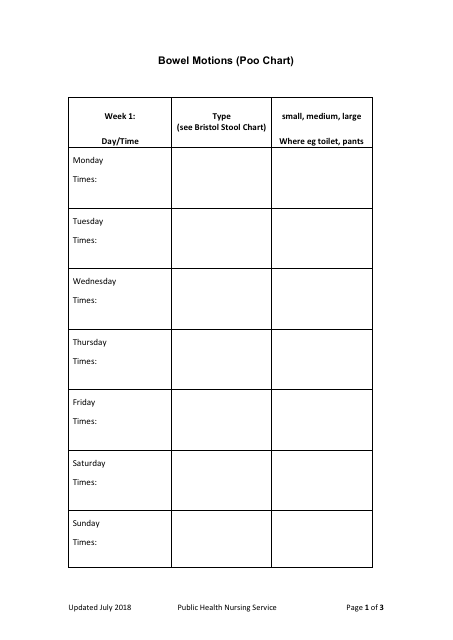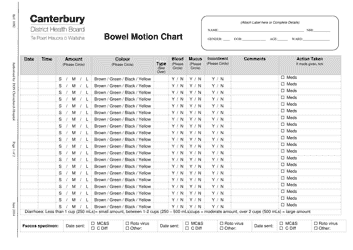Bowel Motions (Poo Chart)
The Bowel Motions or Poo Chart is a visual guide that helps to categorize and understand different types of stool. It is used by healthcare professionals to assess the general health of a person's digestive system and to identify any potential issues or abnormalities. The chart provides a way to monitor bowel movements and can be a useful tool in diagnosing various gastrointestinal conditions.
The individual who passes bowel movements is responsible for tracking their own bowel motions on a poo chart.
FAQ
Q: What is a poo chart?
A: A poo chart is a visual guide that shows different types of bowel movements.
Q: Why is a poo chart important?
A: A poo chart is important because it helps identify and track changes in bowel movements, which can be an indicator of overall digestive health.
Q: How many types of bowel movements are shown on the chart?
A: The poo chart typically shows seven types of bowel movements, ranging from very hard to watery.
Q: What does it mean if my bowel movements are very hard?
A: Very hard bowel movements may indicate constipation or a lack of fiber in the diet.
Q: What does it mean if my bowel movements are watery?
A: Watery bowel movements may indicate diarrhea or an imbalance in the digestive system.
Q: How can I use a poo chart?
A: You can use a poo chart to compare your bowel movements to the different types shown, and assess your digestive health.
Q: When should I be concerned about my bowel movements?
A: You should be concerned about your bowel movements if you experience persistent changes, such as blood in the stool or severe diarrhea.
Q: Should I consult a doctor if I have concerns about my bowel movements?
A: Yes, it is advisable to consult a doctor if you have any concerns or questions about your bowel movements.
Q: Can changes in diet affect my bowel movements?
A: Yes, changes in diet can affect bowel movements. Increasing fiber intake, for example, can help regulate bowel movements.
Q: Is it normal for bowel movements to vary in frequency?
A: Yes, it is normal for bowel movements to vary in frequency. However, if you experience sudden or significant changes, it may be worth discussing with a healthcare professional.












